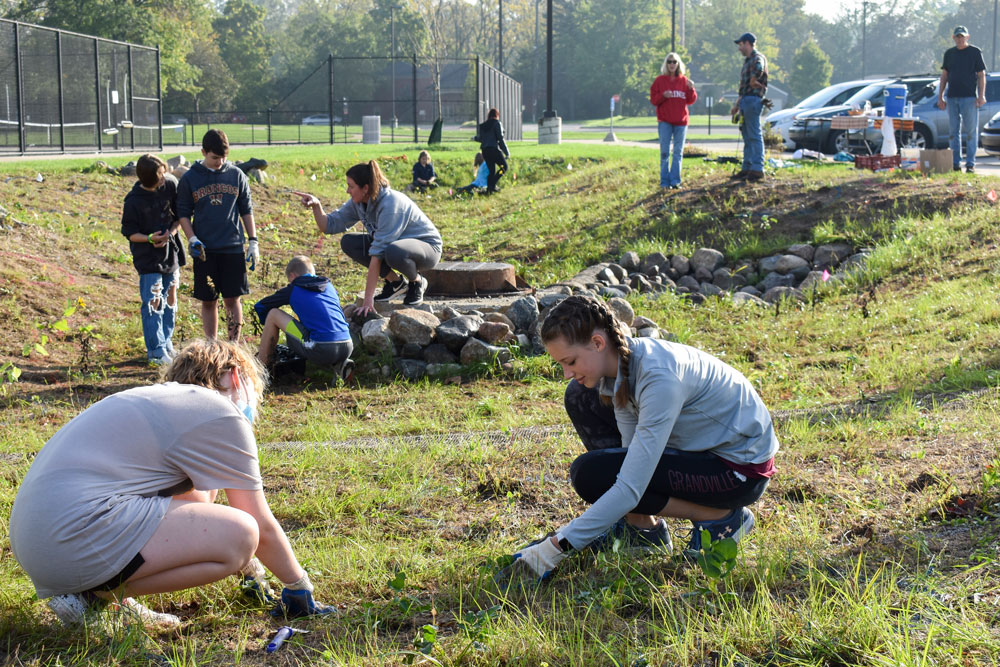Grandville — Zoey VanHeest is only in seventh grade, but she’s already a passionate environmentalist. When she arrived at Grandville Middle School this fall, she made sure to join the Green Team club before anything else.
“I’ve always been very big on (the issue of) water pollution,” she said. “It started in second grade when we did a project on water — that’s when I first heard there was a lot of pollution in the water. And then in fourth grade, I did a project on water pollution and the Great Pacific Garbage Patch … I think that’s where I got my big passion for wanting to help with water and keeping it safe.”
That’s why she was so excited about one of the Green Team’s first projects this year: a partnership with the environmental group Friends of Buck Creek to plant a rain garden on the middle school grounds.
“This makes me feel really happy,” Zoey said, her hands deep in the damp soil, preparing the ground for an influx of false sunflower plants. “This can help our community in lots of different ways.”
The new rain garden at the middle school is a shallow basin-shaped plot of land located between the parking lot and the tennis courts. To transform the land from an empty ditch into a vibrant, pollution-fighting living space, the Green Team spent the day working with local landscape architects from Native Edge to dig holes and put in several types of plants that are native to the area.
Both the garden’s location and shape are crucial to helping protect nearby Buck Creek from pollutants, explained Martha Vermeulen, president of Friends of Buck Creek.
“Think of a rain garden as a sieve that filters, and a sponge that soaks up water,” Vermeulen said. “There was a lot of heated stormwater from the (school) parking lot and other dirty places that was running directly into the creek. Now, with this rain garden, which is a gigantic bowl, the water goes in here instead, and it sits and cools.
“The native plants that the Green Team members are planting will eventually filter that stormwater as well.”

‘Trying Our Best’
To prepare for their day of planting, Green Team advisor and math teacher Kristin Bakker led the group in a lesson on native versus non-native plants, and why native plants are important for a project like this. Because native plants are used to Michigan’s climate and soil content, their roots grow much deeper than non-native plants. This enables them to pull water and nutrients from underground aquifers and continue to thrive, while the pollutants that enter the rain garden remain near the soil’s surface.
For Zoey’s planting partner, fellow seventh-grader and Green Team member Izabella VanderMeulen, the project was a great excuse to get outside, get her hands in the dirt and smell the fresh air. But it was also important to work on something that many people will see on a daily basis, she said.
“I wanted to be on the Green Team to make a difference in our community by helping out in nature,” Izabella said. “Nature is a really big part of our society, but we have so much bad stuff going into our air, our water, and we need something to fight back at (pollution). … People can look at this garden and be like, ‘wow, this is so cool,’ and hopefully it can get more people to help us prevent pollution.
“There’s not a lot of us on the Green Team, but we’re still trying our best.”
The new rain garden is part of a years-long partnership between Friends of Buck Creek and Grandville Middle School. Vermeulen and Bakker previously worked with students on other planting projects, including the addition of native plants as a border along the creek bed.
A former teacher, Vermeulen said it “gives me goosebumps” to see students so invested in the work of protecting the creek and surrounding ecosystem.
“We are borrowing this environment from our children, so they should be involved in protecting it,” she said. “Kristin has done such a great job preparing them, so they know what they’re doing and why they’re doing it, and they’re just having such a good time. And hopefully they’ll continue to do things like this. That’s the goal: get them involved, get them to love it and we all will take better care of our community.”













